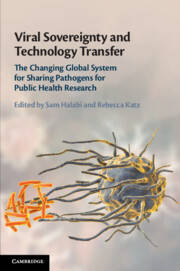 Viral Sovereignty and Technology Transfer
Viral Sovereignty and Technology Transfer from Part III - Solutions: Standard Material Transfer Agreements, Repositories, and Specialized International Instruments
Published online by Cambridge University Press: 15 May 2020
Chapter 8 explores the mechanics of material transfer agreements that accompany transfers of pathogens. Material Transfer Agreements may seem abstract as a manifestation of changing norms in global infectious disease research. Yet, they are, fundamentally, legal agreements, contract, which must be negotiated and analyzed by both researchers and attorneys. Sherry Brett-Major, an attorney representing parties in technology transfer transactions, dissects material transfer agreements as contracts that regulated collaborative relationships. She identifies typologies of MTAs, areas of rights allocation where disputes are frequent, and key decisions that shed light on current MTA negotiation custom and practice. In addition to identify the critical components of MTAs that effectively facilitate collaboration, she provides some of the most significant decisions and disputes that may inform practices and pitfalls during the negotiation process.
To save this book to your Kindle, first ensure no-reply@cambridge.org is added to your Approved Personal Document E-mail List under your Personal Document Settings on the Manage Your Content and Devices page of your Amazon account. Then enter the ‘name’ part of your Kindle email address below. Find out more about saving to your Kindle.
Note you can select to save to either the @free.kindle.com or @kindle.com variations. ‘@free.kindle.com’ emails are free but can only be saved to your device when it is connected to wi-fi. ‘@kindle.com’ emails can be delivered even when you are not connected to wi-fi, but note that service fees apply.
Find out more about the Kindle Personal Document Service.
To save content items to your account, please confirm that you agree to abide by our usage policies. If this is the first time you use this feature, you will be asked to authorise Cambridge Core to connect with your account. Find out more about saving content to Dropbox.
To save content items to your account, please confirm that you agree to abide by our usage policies. If this is the first time you use this feature, you will be asked to authorise Cambridge Core to connect with your account. Find out more about saving content to Google Drive.